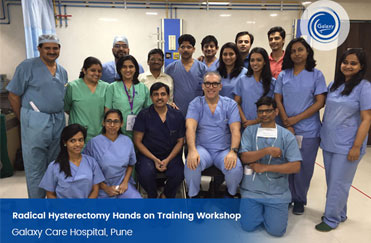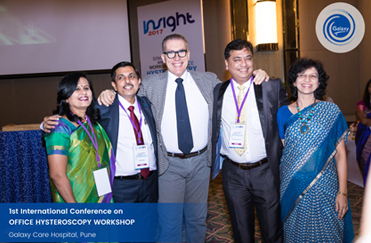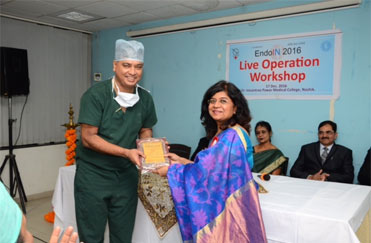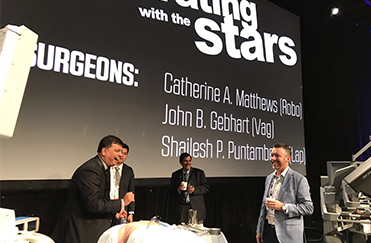India’s First Uterine Transplant by Dr. Shailesh Puntambekar
Dr. Shailesh Puntambekar performed the first uterine transplant of India at “Galaxy Care Laparoscopy Institute, Pune”. Thus, India became the first country in Asia to have successfully carried out Uterine Transplants! Pune is now recognized for this unique feat on the world map for the first successful uterine transplant of the Asian Continent.
One in every 4000 women is born without a uterus. For women born without a uterus or unable to conceive due to a uterine factor, there was no other option except adoption or surrogacy. Uterine transplant opened new possibilities for these women to conceive and give birth to a baby! Uterine transplant has given a ray of hope to thousands of such women without a uterus. This is a great achievement for our country, as India was listed among the top countries in Europe and America for having conducted a successful uterine transplant!
A Promise Delivered!
18th October 2018: Successful delivery of India’s first uterine transplant surgery patient. The first baby girl was born happy and healthy at Galaxy Care Multispecialty Hospital, Pune. Asia’s first uterus transplant baby girl was delivered at Galaxy Care Multispecialty Hospital, Pune — the 12th uterus transplant baby in the world.
The Surgeon Who Taught the World ‘Pune Technique’
He is a born teacher who takes pride in training young surgeons. He was the first in India to perform cervical cancer surgery by laparoscopy in 2003 and published his technique in a renowned American journal as the “Pune Technique” of radical hysterectomy. The technique gained wide popularity due to its simplicity and standardization, allowing surgeons from around the world to easily replicate it.
Dr. Shailesh Puntambekar has been invited by many countries to perform live surgical workshops in Germany, England, France, Romania, Turkey, Israel, Pakistan, South Africa, Tanzania, Kenya, Australia, Mexico, Sri Lanka, Bangladesh and Greece.
He has trained more than 500 surgeons in India and over 200 internationally to perform surgeries using this technique, which has now been adopted by more than 40 countries across the globe. Over the past few years, his lectures on pelvic anatomy have been widely acclaimed for introducing new concepts in the field.
AAGL Spotlight: Making the Country Proud
For the first time for any Indian/Asian, he performed a live surgery from Pune at the AAGL Conference in the USA in 2008, which was watched by over 3,000 surgeons from around the world. Since post-independence, Indian surgeons would traditionally go to the West to learn new techniques, but following this surgery, many international surgeons began visiting his centre in Pune for training.
With an Indian degree, his surgical expertise earned him licenses to operate in multiple countries across Europe, America, Africa, the Middle East, and Asia. He became the first Indian to be elected as a board member of AAGL (American Association of Gynecologic Laparoscopy) and served as its International Secretary General for the Asia-Pacific region
He has won the prestigious Golden Telescope Award for the best video at AAGL four times (in the years 2005, 2009, and 2012), and is the only Indian surgeon to achieve this feat. He also received the Kurt Semm Award for best video at AAGL 2015. He is India’s first robotic oncosurgeon and has performed more than 400 robotic surgeries.
He was also the first Indian to perform all major cancer surgeries laparoscopically and robotically, and holds the largest publication series on laparoscopic surgeries for colorectal, oesophageal, and pancreatic cancers.
Redefining Healthcare Through Selfless Service
Cervical cancer is the leading cancer among women, particularly affecting those from low socioeconomic backgrounds or working as farm labourers. Scarless surgery enables these women to recover faster and return to their daily lives with minimal disruption.
Travelling across the country, he has performed free surgeries in more than 500 live surgical workshops. For the past 22 years, he has been offering free-of-cost surgeries in government hospitals such as Sassoon Hospital, Cantonment Hospital, YCM Hospital, Bharti Hospital, Symbiosis Hospital, GMC Nagpur, as well as in various charitable institutions across Pune. Through these efforts, countless women with uterine and cervical cancer have received laparoscopic or robotic surgery, ensuring painless procedures and a quicker return to normal life.
He has been a driving force in promoting and popularising laparoscopy for all types of cancer surgeries in India. In 2017, he performed the first uterine transplant in India and Asia, right here in Pune. The first two transplants were done completely free of cost for the patients. Till today, every transplant — including two performed at Civil Hospital, Ahmedabad — has been carried out by his team for free.
Pioneering Against All Odds
With no available training or established guidelines in advanced laparoscopy for cancer surgery, he had to self-train—a journey filled with trials and scepticism. Despite criticism from peers for attempting complex cancer surgeries laparoscopically, he persevered. Through sheer determination, he developed his own techniques and successfully performed the world’s first laparoscopic uterine transplant.
His remarkable journey inspired the Marathi movie Shwaas (2004), which won the Dadasaheb Phalke Award and was India’s official entry to the Oscars in 2005. He has also authored a Marathi book titled Scalpel, Scopy, and Robot, along with six medical books and contributions to 20 international publications.
Dr. Shailesh Puntambekar’s journey is a testament to how passion, perseverance, and purpose can redefine the boundaries of surgical excellence.





















